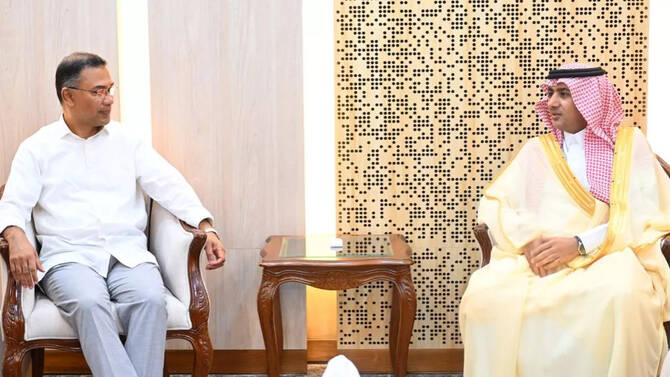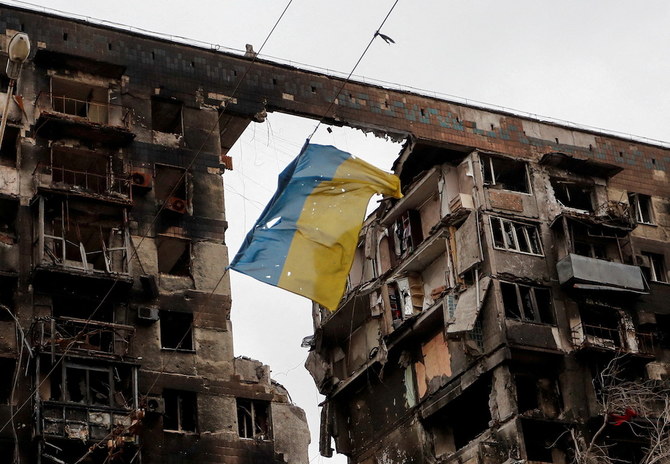Ukraine on Sunday vowed to fight to the end in Mariupol after a Russian ultimatum expired for remaining forces to surrender in the southeastern port city where Moscow is pushing for a major strategic victory.
“The city still has not fallen,” Prime Minister Denys Shmyhal said hours after Moscow’s deadline for fighters holed up and surrounded in a sprawling fortress-like steelworks to surrender passed.
“There’s still our military forces, our soldiers. So they will fight to the end,” he told ABC’s “This Week,” with Moscow shifting its military focus to gaining control of the eastern Donbas region and forging a land corridor to already-annexed Crimea.
Russia’s defense ministry said that there were up to 400 mercenaries inside the encircled Azovstal steel plant, calling on Ukrainian forces inside to “lay down their arms and surrender in order to save their lives.”
Moscow claims Kyiv has ordered fighters of the nationalist Azov battalion to “shoot on the spot” anyone wanting to surrender.
Ukraine President Volodymyr Zelensky said that if Russian forces kill Kyiv’s troops remaining to defend the city, then a fledgling negotiation process to end nearly two months of fighting would be ended.
Russian President Vladimir Putin had already said the talks were at a “dead end.”
Shmyhal said that Ukraine wanted a diplomatic solution “if possible,” but added: “If the Russians wouldn’t like negotiations, we’ll fight to the end, absolutely. We will not surrender.
While several cities are under siege, he said, not one — with the exception of Kherson in the south — had fallen. He said more than 900 towns and cities had been liberated.
As Russia scales up attacks on Ukraine’s eastern flank, at least five people were killed and 13 wounded in a series of strikes in second city Kharkiv, just 21 kilometers (13 miles) from the Russian border and an air strike hit an armaments factory in Kyiv.
Maksym Khaustov, the head of the Kharkiv region’s health department, confirmed the deaths following a series of strikes that AFP journalists on the scene said had ignited fires throughout the city and torn roofs from buildings.
At one site, AFP saw a blood-stained coat next to a pool of fresh blood on the ground. A local reported hearing between six and eight missiles hit in the kind of strike that has become a daily occurrence.
On Friday, shelling of residential areas of the city killed 10 people. On Saturday, a strike claimed two more lives.
Ukrainian Deputy Prime Minister Iryna Vereshchuk urged Russian forces to allow evacuations from Mariupol.
“Once again, we demand the opening of a humanitarian corridor for the evacuation of civilians, especially women and children, from Mariupol,” Vereshchuk wrote.
Zelensky said the situation in Mariupol is “inhuman” and called on the West to immediately provide heavy weapons.
Mariupol has become a symbol of Ukraine’s unexpectedly fierce resistance since Russian troops invaded the former Soviet state on February 24.
The UN World Food Programme says that over 100,000 civilians in Mariupol are on the verge of famine, and lacking water and heating.
Ukraine’s Minister of Digital Transformation Mykhailo Fedorov said the city was on “the verge of a humanitarian catastrophe” and warned the country was compiling evidence of alleged Russian atrocities there.
“We will hand everything over to The Hague. There will be no impunity,” he said.
With fighting raging in the east, Deputy Prime Minister Vereshchuk said that humanitarian corridors allowing civilians to flee would not open on Sunday after failing to agree terms with Russian forces.
Ukrainian authorities have urged people in the eastern Donbas area to move west to escape a large-scale Russian offensive to capture its composite regions, Donetsk and Lugansk.
Celebrating Easter Sunday in Rome, Pope Francis called for peace in Ukraine during this “Easter of war.”
“May there be peace for war-torn Ukraine, so sorely tried by the violence and destruction of the cruel and senseless war into which it was dragged,” the pontiff said in his traditional Urbi et Orbi address on St. Peter’s Square at the Vatican.
“Let there be a decision for peace. May there be an end to the flexing of muscles while people are suffering.”
Francis said he held “in my heart all the many Ukrainian victims, the millions of refugees and internally displaced persons, the divided families, the elderly left to themselves, the lives broken and the cities razed to the ground.
“I see the faces of the orphaned children fleeing from the war.”
A week ahead of Orthodox Easter, men, women and children of all ages streamed into the Bernardine Monastery in the western city of Lviv to bless sprigs of pussy willow on Orthodox Palm Sunday.
Under an ornate gilded ceiling, worshippers huddled on pews or found standing space near the door to engage in private prayer.
On the square outside, Natalia Borysiuk, a 29-year-old who works in the IT sector, held a posy of pussy willow and wheat bound in blue and yellow ribbon, the colors of the Ukrainian flag. She said she had come to pray for “peace and victory.”
“I can’t even talk about how in these eastern cities of Ukraine and Kyiv they suffer now. It’s terrible. But here we can just go to church and pray, and believe in our beautiful and peaceful future,” she said.
Russia warned the United States this week of “unpredictable consequences” if it sends its “most sensitive” weapons systems to Ukraine, as Zelensky has requested.
Its defense ministry claimed Saturday to have shot down a Ukrainian transport plane in the Odessa region, carrying weapons supplied by Western nations.
Ukraine vows to fight to the end in Mariupol as ultimatum expires
https://arab.news/bw4p8
Ukraine vows to fight to the end in Mariupol as ultimatum expires

- It would be the first major city to have fallen to Russian forces since the Feb. 24 invasion
- Russian President Vladimir Putin had already said the talks were at a “dead end”
Saudi ambassador becomes first foreign envoy to meet Bangladesh’s new PM

- Tarique Rahman took oath as PM last week after landslide election win
- Ambassador Abdullah bin Abiyah also meets Bangladesh’s new FM
Dhaka: Saudi Arabia’s ambassador to Dhaka became on Sunday the first foreign envoy to meet Bangladesh’s new Prime Minister Tarique Rahman since he assumed the country’s top office.
Rahman’s Bangladesh Nationalist Party made a landslide win in the Feb. 12 election, securing an absolute majority with 209 seats in the 300-seat parliament.
The son of former Prime Minister Khaleda Zia and former President and BNP founder Ziaur Rahman, he was sworn in as the prime minister last week.
The Saudi government congratulated Rahman on the day he took the oath of office, and the Kingdom’s Ambassador Abdullah bin Abiyah was received by the premier in the Bangladesh Secretariat, where he also met Bangladesh’s new foreign minister.
“Among the ambassadors stationed in Dhaka, this is the first ambassadorial visit with Prime Minister Tarique Rahman since he assumed office,” Saleh Shibli, the prime minister’s press secretary, told Arab News.
“The ambassador conveyed greetings and best wishes to Bangladesh’s prime minister from the king and crown prince of Saudi Arabia … They discussed bilateral matters and ways to strengthen the ties among Muslim countries.”
Rahman’s administration succeeded an interim government that oversaw preparations for the next election following the 2024 student-led uprising, which toppled former leader Sheikh Hasina and ended her Awami League party’s 15-year rule.
New Cabinet members were sworn in during the same ceremony as the prime minister last week.
Foreign Minister Khalilur Rahman is a former UN official who served as Bangladesh’s national security adviser during the interim government’s term.
He received Saudi Arabia’s ambassador after the envoy’s meeting with the prime minister.
“The foreign minister expressed appreciation for the Saudi leadership’s role in promoting peace and stability in the Middle East and across the Muslim Ummah. He also conveyed gratitude for hosting a large number of Bangladeshi workers in the Kingdom and underscored the significant potential for expanding cooperation across trade, investment, energy, and other priority sectors, leveraging the geostrategic positions of both countries,” the ministry said in a statement.
“The Saudi ambassador expressed his support to the present government and his intention to work with the government to enhance the current bilateral relationship to a comprehensive relationship.”
Around 3.5 million Bangladeshis live and work in Saudi Arabia. They have been joining the Saudi labor market since 1976, when work migration to the Kingdom was established during the rule of the new prime minister’s father.
Bangladeshis are the largest expat group in the Kingdom and the largest Bangladeshi community outside Bangladesh and send home more than $5 billion in remittances every year.















